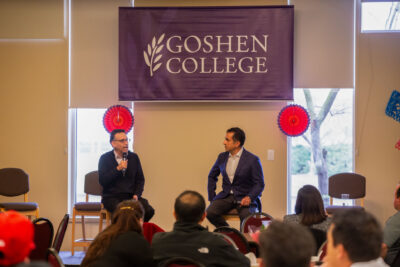It took almost two years of living with an old-order Anabaptist community in Tennessee for author Eric Brende to find the reality that he was looking for.
Brende, author of Better Off: Flipping the Switch on Technology, visited Goshen College on Sunday, Oct. 31 to speak on how technology has distorted humans’ view of reality and what he has done to make peace with such technology.
Sitting at the piano in the Music Center, Brende used musical metaphors to illustrate how important music had been in his development and understanding of life. Early in the event, he took two volunteers from the audience. With their help, he created a scene of a man walking towards a woman. Then he had them repeat the actions three more times, adding a different piano soundtrack each time the scene played out in an attempt to show how sound changes how we view what is going on around us. He went on to explain that while a good movie soundtrack is not noticed, it shapes the meaning without the viewer realizing it, making the soundtrack “akin to God.”
The focus of the speech then turned to humans’ dependence on technology. Technology, he said, draws people in because it allows them to “digitize” their reality, or in other words create a new reality, and therefore feel like they are playing the part of God. “It becomes possible to make our entire lives digitally vicarious,” he said.
While a student at the Massachusetts Institute of Technology, Brende began to realize the superficiality of digital experiences. “I had it all except for the life,” he said. He became burned out by the pseudo-experiences that he was having through technology. “I was starving for reality,” he said. This led him to the community of Anabaptists where he lived “off the grid” for the next 18 months, and what inspired him to write Better Off.
While living among this group that he dubbed the “Minimites,” he used no electronics and did not drive a car. He found that by taking away all modern technology, there was nothing left but physical toil. While society sees such toil as a negative, he saw the monotony of life in the "Minimite" community as a provider of a “live-giving pulse.” There was much more time to interact with others in the group, and even when conversation with others lacked, he found that he could still converse with himself, as well as the cosmos through daydreaming. Brende enjoyed the style of life he lived where everything was connected, whether it was food, exercise, or mental stimulation.
While Brende praised the green movement to an extent, he feels that it is not doing enough to change society. He argues that humans still cling to the idea that labor-saving technology is more sufficient only operated on alternative sources of energy. He finished by adding that while it is not entirely possible for he and his family to completely disregard all forms of technology, he gave examples of how they have set guidelines for their use. He explained how he had rented a car to get to Goshen but that his family had gotten rid of the car that they actually owned. He does use internet and email, but that it is through the local library in his home city of St. Louis.
Brende left the audience with the idea that in modern society, humans have “disassembled mother nature’s time keeping apparatus” and that multi-tasking is our way of trying to connect those areas of life that the "Minimites" could connect naturally. He realizes that technology and its advancement is not going to go away, but his hope is that humans can learn about how the "Minimites" live, and how he lived while in their community, and do as he has done and integrate their lifestyle with the electronically connected world that we live.

